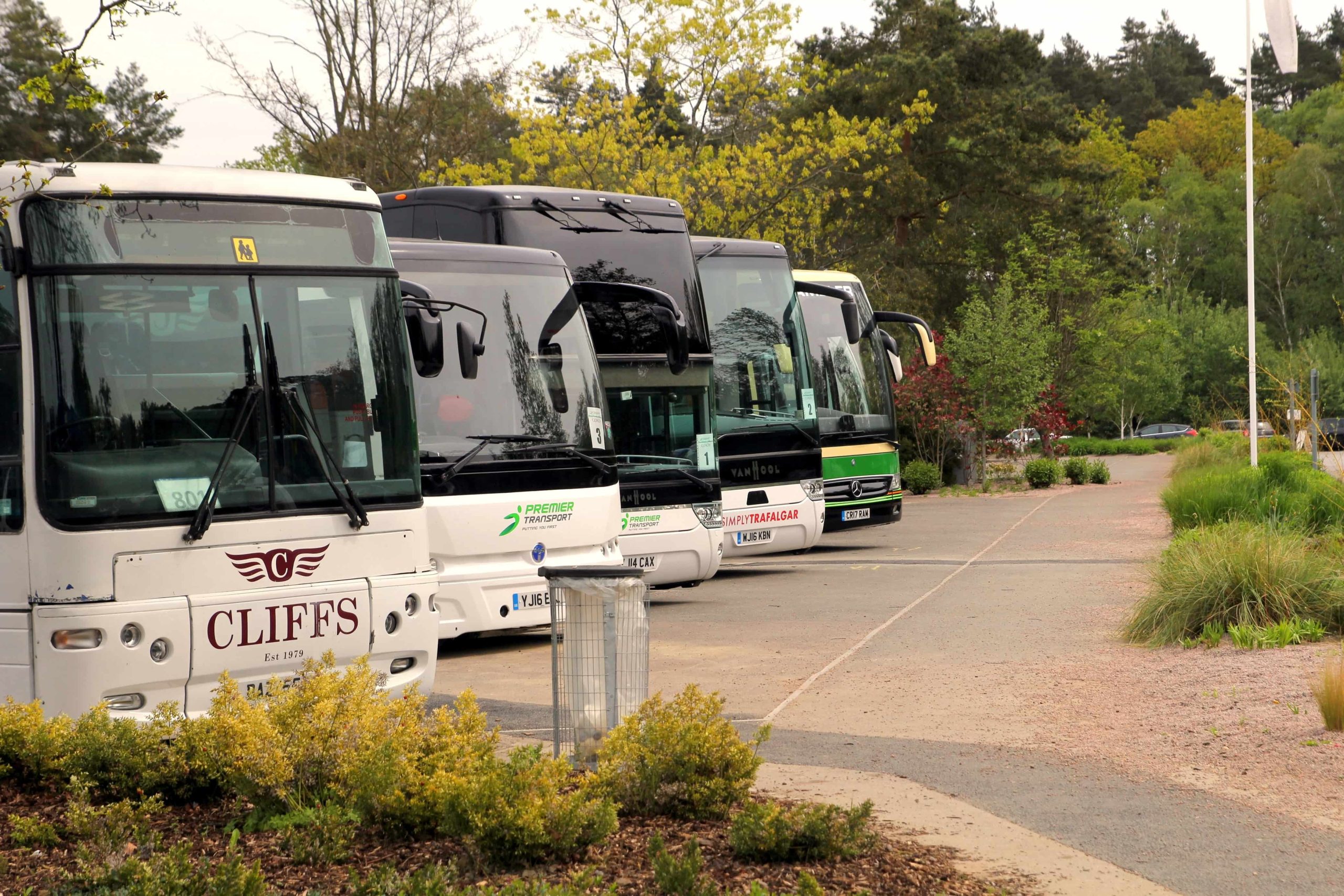Three industry heavyweights reveal that not all coach work is equal in 2023. Is it time for the sector to reconsider its approach to coach hire?
In recent years, the coach industry has faced significant challenges, with rising costs, increased competition, and changing consumer preferences impacting the sector.
As we move deeper into 2023, some within the industry have said there is a growing sense that operators may need to reassess the type of work they do to remain resilient in the face of ongoing challenges.
To explore the topic further, we spoke to a number of businesses within the coach sector to gather insights and perspectives on whether 2023 is a year that will demand a new business approach.
‘Watershed moment’
In a recent interview with routeone, Kevyn Jones, Managing Director of Turners Coachways in Bristol, expressed his optimism about the future of intercity coach travel, arguing that the fundamentals are present for a “good year of growth”. He reveals that the driver situation has improved significantly since the COVID-19 outbreak, and there are no shortages of engineering or admin staff, which was a significant problem 12-18 months ago.
He goes on to discuss the impact of the pandemic on the coach industry, saying that it will be a game changer. “Many longstanding companies left the industry for whatever reason, whether it was by force or through choice, and my personal view is that this is a watershed moment,” he says. “The UK coach market is different to many European coach companies, and I think we have been a little bit too far behind the times in the UK. This has given us the opportunity to reset – to look, as an industry, at what type of work we want to do, our reasons for doing that work, and to focus people’s businesses. It’s an interesting time to be a coach operator.”
One result of that, he believes, is that smaller coach operators may be more likely to make business agreements with larger multinational corporations. This comes shortly after Turners announced a significant partnership expansion with FlixBus, of which it was a launch partner in the UK.
“For individual coach companies, which historically were a bit of a cottage industry, and which did not necessarily look at the bigger picture, these type of agreements with large multinationals are, I think, the type of partnership that will be more common for a coach company post-pandemic,” he says.
‘All about the drivers’
Passenger Plus, a prominent player in the corporate transport sphere, has been thriving in the latter half of 2022, with corporate transport rebounding strongly since the pandemic. As the winter season draws to a close, the company reveals that March has been just as busy as July 2018, indicating the strength of the rebound.
According to Managing Director Mark Drury, the rates for corporate transport are “where they need to be” and are higher than traditional leisure. Consequently, the operator is expanding rapidly with the addition of new vehicles and a significant pay increase for its drivers.
Looking ahead to 2023, Mark believes that operators with new vehicles and skilled drivers will enjoy a strong trading year. He emphasises that success is less about the cost of transport services and more about the operator’s ability to deliver them.
Passenger Plus already has many days booked in the year ahead, including in shoulder months, which typically would have been easier to fill with short notice hire. “Now we have days where we just can’t,” he says. “In the past we would take on extra work and broker it out to trusted operator partners. We try not to do that now, because we don’t want to be in the position where one of them can’t fulfil it.”
The Surrey operator recently diversified its portfolio by taking on school runs for private institutions, which are lucrative but competitive. In his location, at least, Mark believes that operators relying on school runs for constant, baseline work will have to reassess their strategy: “Those operators that relied on the school run to pay the bills and give them their regular income every week either have to put their rates up, or just stop doing it.
“In our area, a lot of operators have stopped – and that may well be that they have looked how much they are making out of it and decided they don’t want to do that anymore. There’s now a vacuum where we are, and certainly in London, to try and get operators to do the cheaper end of home-to-school work.”
Passenger Plus prices its school runs similarly to its corporate hires, taking into account that schools only rely on the coaches for 190 days a year, with an increase necessary to make up for the shortfall. Despite the higher pricing, the company has won four contracts through Zeelo and with two private schools on its own initiative.
Ultimately, and unsurprisingly, the issue of drivers is the biggest issue concerning operators for the year ahead, Mark continues. He emphasises how shortages limit the amount of work operators can undertake. “So many people have left the industry that the lack of drivers has made operators ask, ‘what’s my limiting factor to how much work can I take on?’” he explains. “The answer used to be whether they had hired out every vehicle. Now, it’s whether they have the drivers for the number of vehicles they want to put on the road.” One consequence is that Passenger Plus puts a high premium on late-night work, as that driver is lost during the following day. Passenger Plus makes no intention to give customers lower rates if a coach has already earned its keep during the day – day or night, full rate is charged.
Getting those rates right has meant the operator was able to launch a “top-tier driver rate” of £19/hour during the week and £22.50/hour during weekends. Mark says an annual salary of £70,000 is achievable as a driver, and goes a long way to addressing the issue of retention. “That’s an unbelievable rate,” he adds. “Three to four years ago, it was half of that. But that’s how it has to be. We want people who can do the job, and who can do the job right. They are worth it. If operators get the rates right, they can afford to pay that. And we have got to break the idea that drivers are not worth it.”
Future is one of consolidation?
Anthony Marett, Vice Chair at the UK Coach Operators Association (UKCOA) and owner of Norfolk operator Marett’s Chariots, agrees that it is currently a dynamic time for coach operators.
Marett’s has been fortunate in its location and supply. Like Mark and Kevyn, Anthony reflects on the loss of many operators in its area over recent years, revealing that there has undoubtedly been a seismic shift in the capacity of supply of coach hire in Norfolk. “Current capacity does not come close to meeting demand,” he says.
As a result, Marett’s has only been able to take three of every 10 jobs requested. The other side of the coin is that Marett’s has been lucky with drivers, and is now being approached frequently by drivers asking for work, meaning its capacity to pursue hires is increasing.
Whether operators need to reassess the type of work they do in 2023 depends on their area, Anthony believes. In his capacity as Vice Chair at UKCOA, he reveals that fellow members of the coach trade body have not been as lucky as himself. The continental coach holiday market has not returned to normal, and Anthony expects it will not for some time. But he is unanimous with the opinion of Mark at Passenger Plus in that operators that once relied on home-to-school hire as their baseline income will need to re-examine their business model.
“Even before the pandemic, my own personal view as a coach operator was that the days of a coach company relying heavily on school contracts is coming to an end,” he says. “The local authorities have got an obligation to get the best price, and coach operators want to get the best price, and I do think bus companies are better placed to offer cheaper school runs than coach companies.”
As a business, Marett’s has spent much time and energy in building up a private hire base, using search engine optimisation and Google AdWords to raise its online profile. The other area it has seen growth has been in corporate transport, which Anthony says peaked last year at £13,000 per week – this after Marett’s had never examined this market before. “We’re bombarded with companies wanting us to price for taking their staff to work. I’ve never known anything like it,” he says.
Anthony believes the future now for the industry is one of consolidation. With many operators having ceased trading, surviving companies will need to fill that void, meaning expansion is on the horizon. That brings many benefits. “I think there will be fewer operators, but bigger operators,” he explains. “In many ways that means that dealing with legislation and regulations, and the changes in technology and powertrains, will probably be easier. That consolidation has already started and will continue throughout the year. We have a glorious opportunity, and it’s a good time to be a coach operator.”






























